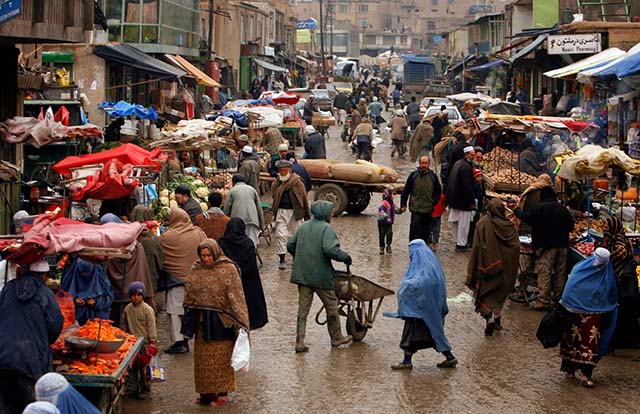The current economic stagnation and unemployment have compounded poverty across the country. Scores of individuals immigrated to foreign lands to flee the relentless financial challenges. However, the war-widowed women and orphaned children are left at the mercy of pain and suffering emanating from hunger and insecurity. The cold weather aggravate their problems and the families who have lost their bread-earners in war, terrorist attacks or landmines walk on streets to garner charity from passersby, shopkeepers, etc. so as to resist starvation and stay alive as long as their fate has decided.
The destiny is really cruel to the workers who labor from the dawn to the fall of dusk to make the ends meet, however, their rights to life and property are not ensured. Some hawkers, vendors, storekeepers and passersby were killed in suicide bombings in capital city of Kabul within past years while struggling to earn bread for their families. Similarly, some businessmen were killed mysteriously last year by unknown armed men. So, the civilians are vulnerable to terrorist attacks on bright days in the heart of big cities and there is no safe work-environment for ordinary citizens.
It would be worthwhile to glance over the agenda of the heads of National Unity Government (NUG) during their presidential campaigns. Afghan CEO Dr. Abdullah Abdullah’s agenda for Afghanistan was as: national solidarity; abolishing administrative corruption; dealing with the challenges of the Afghan IDPs; decreasing illiteracy; providing job opportunities; struggling for the betterment of the economy and fighting poverty; commitment for providing human rights , especially women’s rights; bringing reformation; attending to the unity of the country’s army; establishing good relations with the neighboring countries and establishing a ministry of the Youth Affairs.
President Muhammad Ashraf Ghani declared that if he won the election his future agenda would be as: establishing good governance, combating administrative corruption, building a government based on justice, building infrastructural structure for better economy, giving participatory role to women and youngsters, combating violence, providing nationwide security, strengthening national solidarity and building a strong nation.
Besides bringing in peace and ensuring the citizens’ rights, Dr. Abdullah vowed to “provide job opportunities” and “fight poverty”. Similarly, Ghani mentioned a list of mouth-watering plans to fulfill including “building infrastructural structure for better economy”. However, a year has passed from the establishment of NUG and none of the elements in two aforementioned lists have come true. Indeed, achieving the above agendas in a war-torn country overnight is not practicable. The NUG inherited militancy, administrative corruption, poverty, etc. from the previous government, as the heads stated months ago. Ill-fatedly, militancy and poverty have increased in recent months and political wheeling and dealing deteriorated. The excessive brain drain is a matter of great concern for the public, mainly for Afghan MPs. Seemingly, the realm of poverty expands with each passing day as there is no strategy from the government to curb the issues.
It is a great pity to see that the families of war victims are not paid heed by the state. And it is more heart-wrenching when the children of dead soldiers – who sacrificed their lives for the nation – wander on the streets and labor in hot summers and cold winters to get a morsel of bread rather than going to school. Likewise, the widows who lost their spouses in battle against the insurgents are fated to beg on the streets – it is really great injustice to them.
Regarding school children, it is needless to say that poverty either forces them to abandon school or drastically affects their success in school. A child’s “home activities, preferences, mannerisms” must align with the world and in the cases that they do not. These students are at a disadvantage in the school and most importantly the classroom.
Therefore, it is safe to state that children who live at or below the poverty level will have far less success educationally than children who live above the poverty line. Poor children have a great deal less healthcare and this ultimately results in many absences from the academic year. Additionally, poor children are much more likely to suffer from hunger, fatigue, irritability, headaches, flu, and colds. These illnesses could potentially restrict a child or student’s focus and concentration.
Deterioration of living conditions can often compel children to abandon school to contribute to the family income, putting them at risk of being exploited – which is rife in our country.
Constitutionally, the government will have to “form a civil society void of oppression, atrocity, discrimination as well as violence, based on rule of law, social justice, protecting integrity and human rights, and attaining peoples’ freedoms and fundamental rights; strengthen political, social, economic as well as defense institutions; attain a prosperous life and sound living environment for all inhabitants of this land; and, eventually, regain Afghanistan’s appropriate place in the international family”.
It is self-explanatory that security situation plays a significant role in economic issues.
When the rights and safety of NGOs, private investors, stakeholders and traders are not ensured, they will not continue their business at the cost of their life. The government has to give priority to security issue so as to provide a safe environment for the investors and tackle the economic challenges. Hence, security will pave the way for economic boom which will create job opportunities and mitigate the current problems.

